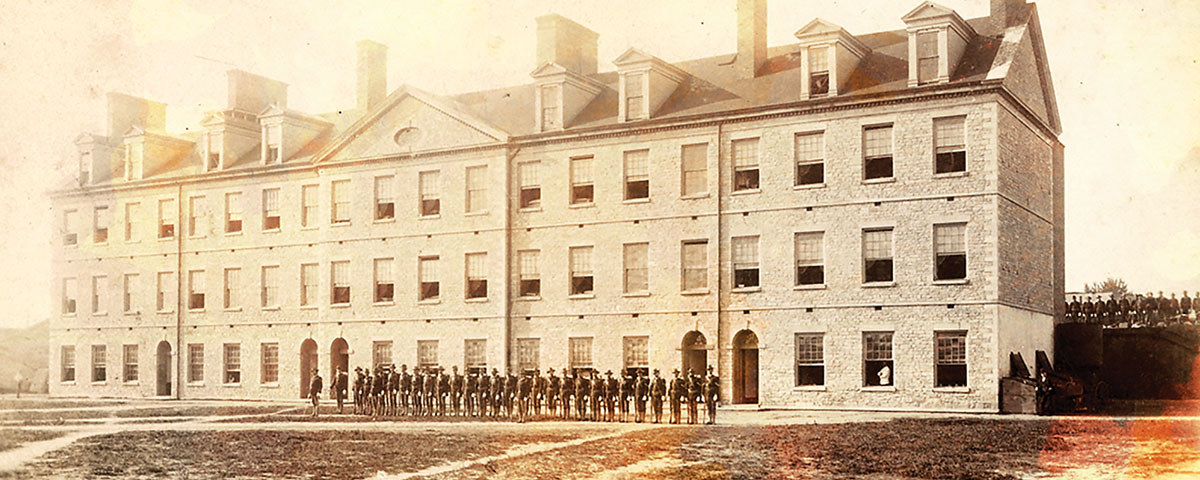What happens when civilian law and military law collide? An 1887 case helped to settle the question
IN NATIONS WHERE MILITARY LAW IS NECESSARILY SUBORDINATE to civil law, the two legal systems coexist inside clearly defined jurisdictions. Occasionally, however, cases arise that push or even cross those boundaries. For the U.S. Army, such a case occurred at Fort Wayne in Detroit, Michigan, in 1887.
On July 11 of that year, during the garrison’s afternoon retreat ceremony, the prisoners in the guardhouse formed up outside the lockup while Sergeant of the Guard James Clark conducted the daily inspection of the facility. At the same time, the adjutant read the orders of the day to the assembled troops.
The orders included the announcement of verdicts and sentences of courts-martial, and it was at this moment that one of the prisoners, Private Arthur Stone, learned for the first time that he faced a dishonorable discharge and two years’ confinement at hard labor for having falsely accused an officer of stealing a cane.
On hearing this, Stone broke from the ranks and ran for the fence that separated the military reservation from the civilian community just across the street. Two other soldiers—the regimental quartermaster sergeant and an enlisted man named Duff—took off after him, but Stone had a head start and was faster than his pursuers. The quartermaster shouted at him to halt, yelling, “There is a load after you!”—meaning that a bullet might be coming his way. Stone kept running.
Hearing shouts that a prisoner was escaping, Clark ran out of the guardhouse, loading a live round into his rifle. By this time Stone was about 30 yards ahead of his closest pursuer, Duff, who, witnesses later reported, “did not seem to be gaining upon him, and stood little if any chance of overtaking him before he could gain the street.” Clark, from a distance of about 80 yards, shouted for Stone to halt. Stone kept running. Clark then raised his weapon, took quick aim, and fired. The .45 caliber bullet struck Stone in the back—a mortal wound from which he died later that evening.
The post commander immediately convened a court of inquiry in accordance with Article 115 of the Articles of War. The investigation determined that, as sergeant of the guard, Clark had a statutory obligation to prevent the escape of any prisoner in his charge and that it was lawful for him to use lethal force to fulfill that obligation when other options failed. The inquiry also revealed that Clark and Stone had known each other well before the unfortunate incident, that the two men were friends, and that when Clark fired he did not know the identity of his target. The army completely exonerated Clark of any wrongdoing in Stone’s death.
THE MATTER MIGHT HAVE ENDED THERE, BUT AN ENTERPRISING REPORTER reporter from a local newspaper brought a formal complaint of murder against Clark “for the reason that the alleged offence had been committed at Fort Wayne, a place under the exclusive jurisdiction of the United States.” Fort Wayne, it turned out, was not a formally designated military reservation, as most army posts were. The county sheriff arrested Clark on a charge of first-degree murder.
The case drew the immediate attention of the War Department. If a soldier in the performance of his duties could be cleared by a military court but subsequently prosecuted by a civilian court for the same act, it opened a huge area of potential hazard for military personnel. Therefore, when Clark went to trial before Judge Henry B. Brown, no fewer than four attorneys appeared for his defense, including Asa B. Gardiner, a judge advocate of the U.S. Army.
At trial the prosecutor argued that Clark was not justified in using lethal force to prevent Stone from escaping, even though military law specifically allowed him to do so. Gardiner countered that if such a contention were correct, “military guards should hereafter be armed with clubs and fleet-footed runners employed to prevent the escape of prisoners.” He cited paragraphs 364 and 365 of the Army Regulations of 1868, which specified that soldiers on guard duty were not allowed to divest themselves of their equipment or set down their weapons. “If Sergeant Clark had thrown off these impediments in order more readily to pursue the fleeing prisoner,” Gardiner argued, “he would have committed an offence” under military law. He concluded his arguments by saying, “So long as the United States arms its guards with muskets and makes it an offence to suffer a prisoner to escape or to aid him in doing so, the guard is invested with discretionary power to determine for himself whether when a prisoner is escaping he shall use his piece to prevent it.”
Judge Brown acknowledged that the collision between military and civil jurisdiction was tricky ground for the court. He had agreed to hear the case, he wrote, to uphold the crucial American principle that civil power is supreme and that “soldiers are equally with all other classes of citizens bound to the same strict observance of the laws.” He then laid out the facts of the case as he had determined them:
There is no doubt that the deceased was killed by [Clark] under the performance of a supposed obligation to prevent his escape by any means in his power. There is no evidence that [Clark] fired before the necessity of doing so had become apparent. Stone was called upon several times to halt…his nearest pursuer was not gaining upon him, and in another half-minute he would have scaled the two fences between him and the highway….There is not the slightest reason to believe that [Clark] was not acting in obedience to what he believed to be his duty in the premises….The case, then, reduces itself to the naked legal proposition, whether [Clark] is excused in law in killing the deceased.
The prosecutor argued that, under Michigan law, lethal force could only be used to prevent a prisoner’s escape if the man had been convicted of a felony, saying, “but he may not do this if he be charged simply with a misdemeanor, the theory of the law being that it is better that a misdemeanant escape than that human life be taken.” Private Stone, he pointed out, was convicted by a military court on a charge that was not considered a felony under civilian law. Judge Brown answered this by noting that in American military law there was no distinction between a felony or a misdemeanor, and he concluded that the argument therefore had no bearing on the case. “We are bound to take a broader view and to measure the rights and liabilities of the prisoner by the exigencies of the military service, and the circumstances of the particular case,” he wrote. “It would be extremely unwise for the civil courts to lay down general principles of law which would tend to impair the efficiency of the military arm, or which would seem to justify or condone conduct prejudicial to good order and military discipline.”
After acknowledging that military law by its very nature might seem to civilians to be a “code of Draconian severity,” Brown declared that it would be a fundamental error to try to apply civilian standards to every aspect of military law or action. He also observed that there was a great, gaping hole in American military law into which Clark’s case fell completely. “There is a singular and almost total absence of authority,” the judge wrote, “upon the subject of the power of a military guard in time of peace.” With that in mind, he then tried to apply the law as best he could to the case.
Above all, Judge Brown said, Clark had acted in good faith that he was obeying a lawful order—“indeed I incline to the opinion that it was legal,” he wrote. If the order was valid, then all that mattered was whether Clark had followed it correctly in firing the fatal shot or exceeded his authority in doing so. Brown then ruled that Clark was justified in his actions and that the orders he followed at the time were lawful. He declared Clark acquitted and released him from custody.
Clark’s case established the crucial precedent that “the common-law distinction between felonies and misdemeanors has no application to military offenses.” While the court acknowledged that acquittal in a military court would not always insulate a defendant from prosecution in a civil court for violations of civil law, it firmly set the notion that a military court’s decision should hold “great weight” in any further legal proceedings. MHQ
JOHN A. HAYMOND is the author of The Infamous Dakota War Trials of 1862: Revenge, Military Law, and the Judgment of History (McFarland & Company, 2016).
[hr]
This article appears in the Winter 2018 issue (Vol. 30, No. 2) of MHQ—The Quarterly Journal of Military History with the headline: The Murky Line
Want to have the lavishly illustrated, premium-quality print edition of MHQ delivered directly to you four times a year? Subscribe now at special savings!






